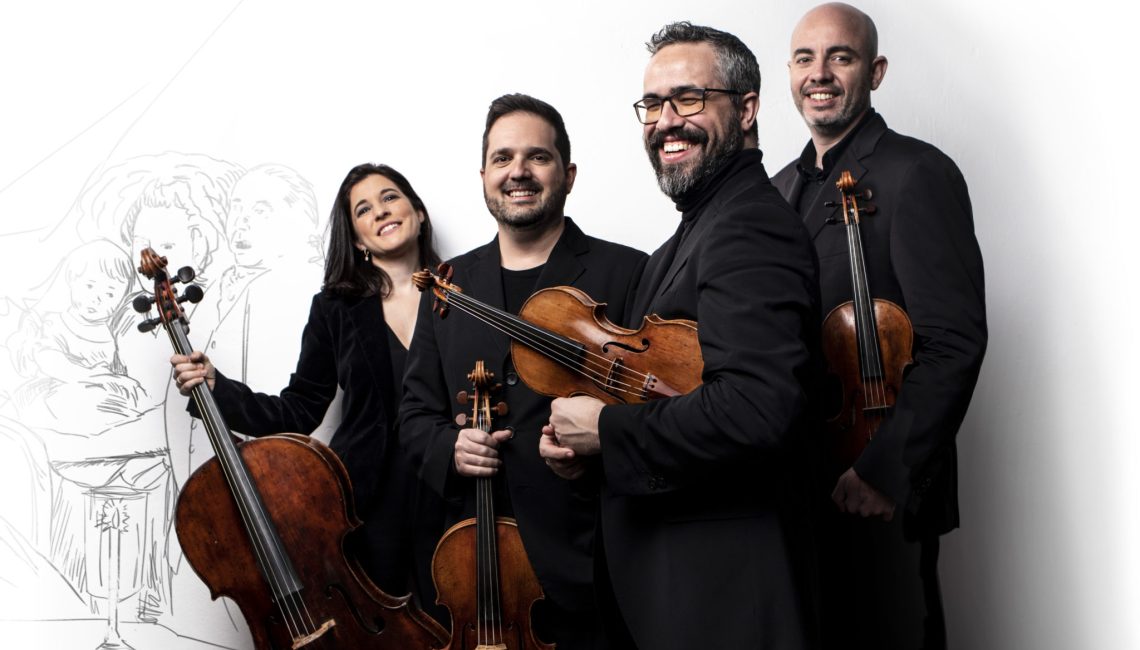
Photo: Igor Studio
Cuarteto Quiroga
Aitor Hevia, violin
Cibrán Sierra, violin
Josep Puchades, viola
Helena Poggio, cello
Praised by The New York Times for its “exquisite and interpretively fresh performances”, Cuarteto Quiroga has established itself as one of the most dynamic and unique quartets of its generation, winning international acclaim from critics and audiences alike for its distinctive personality as well as its bold and original approach to the string quartet repertoire.
Winners of the prestigious 2018 National Music Award of Spain and prize winners of several major international competitions (Bordeaux, Paolo Borciani, Geneva, Beijing, Fnapec-Paris, Palau Barcelona), in 2013 Cuarteto Quiroga became the first artists in residence of the Royal Palace of Madrid, allowing them to give performances on a unique set of decorated Stradivari instruments.
The Quartet appears at venues including the Pierre Boulez Saal, Konzerthaus and Philharmonie in Berlin, Wigmore Hall London, The Frick Collection and Lincoln Center in New York, DaCamera in Los Angeles, National Gallery of Art in Washington DC, Amsterdam Concertgebouw, Konserthuset Stockholm, Auditorio Nacional in Madrid, Stadtcasino Basel, Mozarteum Salzburg, Laieszhalle Hamburg, Liederhalle Stuttgart, Barcelona’s Palau de la Música, De Doelen Rotterdam, Gonfallone di Roma, La Pergola Firenze, Les Invalides in Paris, Martinu Hall in Prague, and at festivals including, among others, Heidelberger Frühling, Schwetzinger Festspiele, and the String Quartet Biennale Amsterdam.
Regular stage partners include Martha Argerich, Jörg Widmann, Veronika Hagen, Javier Perianes, Clemens Hagen, Valentin Erben, Richard Lester, David Kadouch, Jonathan Brown, Cappella Amsterdam, and the Doric, Meta4 and Ardeo string quartets.
Passionate advocates of contemporary repertoire, the Quartet collaborates regularly with living composers, and is dedicated to presenting and recording new works to establish a constant dialogue between tradition and new music. They have premiered works by prominent composers such as Peter Eötvös, Cristóbal Halffter, Jose María Sánchez-Verdú, Antón García-Abril, Jesús Villa-Rojo, Nicolas Bolens, Marisa Manchado, Narine Khachatryan, and Cecilia Díaz. They have performed the complete works by György Kurtág and, in future seasons, they will premiere works by Jörg Widmann, Jonathan Dove, Raquel García-Tomás and Konstantia Gourzi.
Since 2012, Cuarteto Quiroga has embarked on an ambitious journey to build an inspired and unique recording catalogue with the independent Dutch label Cobra Records. Autumn 2023 they presented their latest album “ΑΤΟΜΟΣ”. A homage to the essence with music by Haydn, Beethoven, Bartok and a discographical first recording by Kurtag.Their former disc, “Und Es Ward Licht”, recorded with the world renowned violist Veronika Hagen describes, through works in C-major of Haydn & Mozart, the birth of chamber music as the true musical metaphor of the Enlightenment. Another acclaimed CD, Heritage, offers an eloquent anthology of the string quartet music scene in Madrid in the time of Goya. Released in 2019, this “necessary album” (Scherzo) is performed on gut strings and it includes two world premiere recordings by Boccherini and Brunetti. Their debut album, pairing Haydn and Webern with Sollima, won the CD of the Year 2012 Award, given by the Independent Producers Union. Previous critically acclaimed recordings for Cobra include albums of the early music of Schönberg, Webern and Alban Berg; of Brahms’ Opus 51 quartets; and of Bartók, Ginastera & Halffter. In 2016, they released a recording with Javier Perianes for Harmonia Mundi including piano quintet rarities by Granados and Turina.
Formed in 2003, Cuarteto Quiroga takes its name from the Galician violinist Manuel Quiroga, one of the most outstanding string players in Spanish music history. They studied with Rainer Schmidt at the Escuela Superior de Música Reina Sofía in Madrid, with Walter Levin at the Musikakademie in Basel, and with Hatto Beyerle at the European Chamber Music Academy. Further important artistic influences are György Kurtág, András Keller, Ferenc Rados, Johannes Meissl & Eberhard Feltz.
Strongly committed to chamber music teaching, they hold professorships at the Conservatorio Superior de Música in Zaragoza, Mozarteum University in Salzburg, Musikene in San Sebastián, and at the Real Conservatorio Superior de Música in Madrid. They are regularly invited to give masterclasses at universities and music conservatories throughout Europe, the USA, and Latin America.
The Quartet’s violinist Cibrán Sierra plays the 1682 Nicola Amati violin “Arnold Rosé” generously on loan from Paola Modiano’s heirs.
Artist's/Ensemble's own website